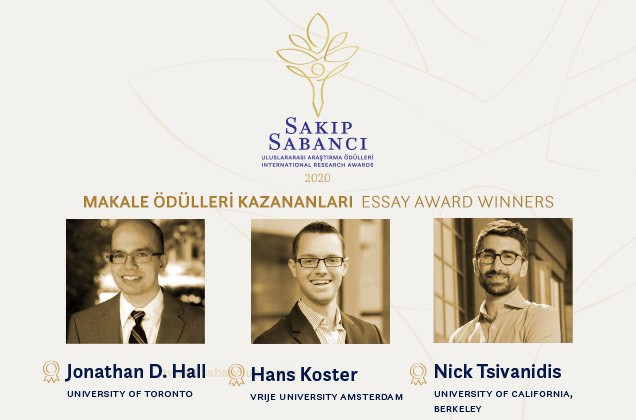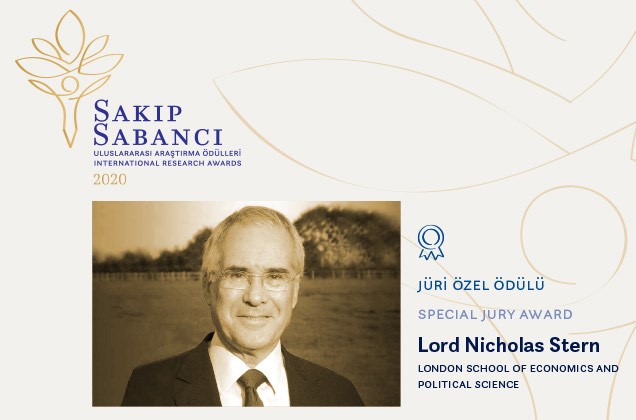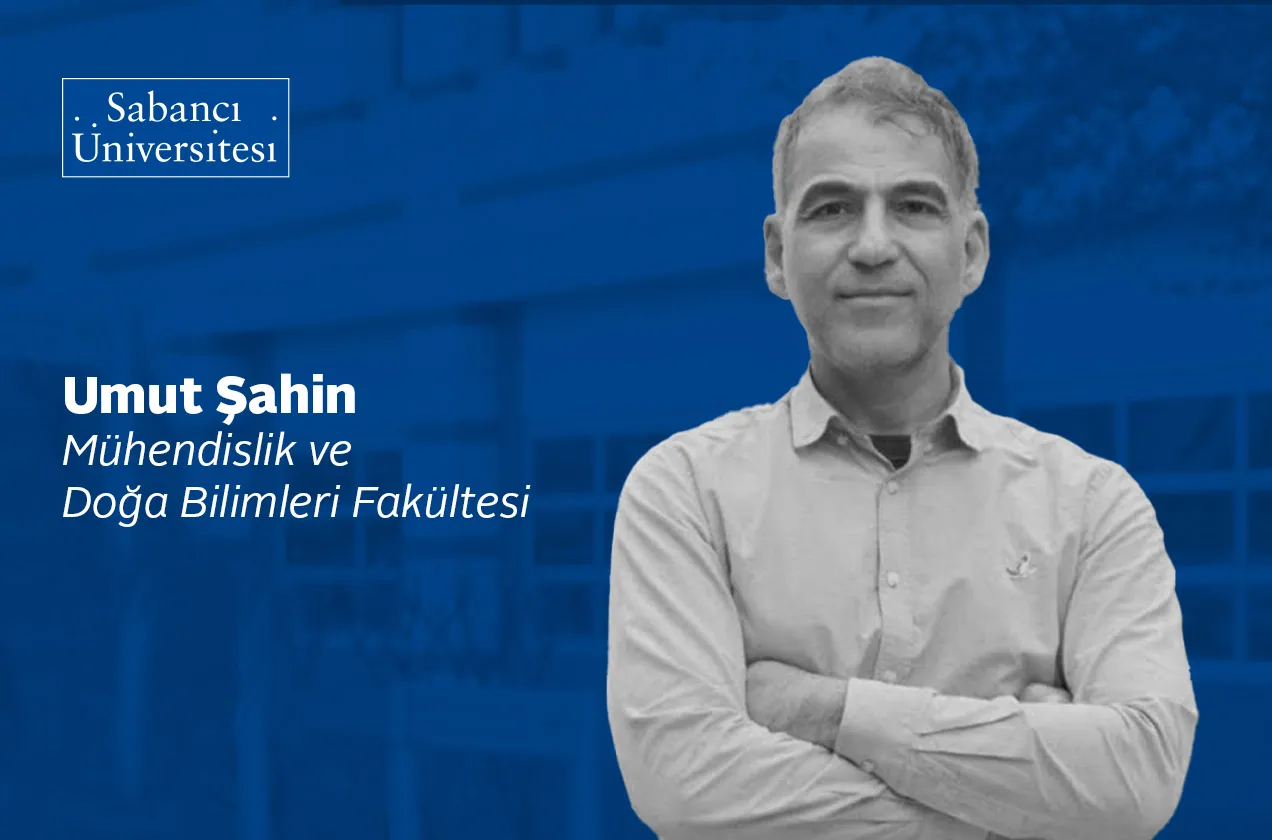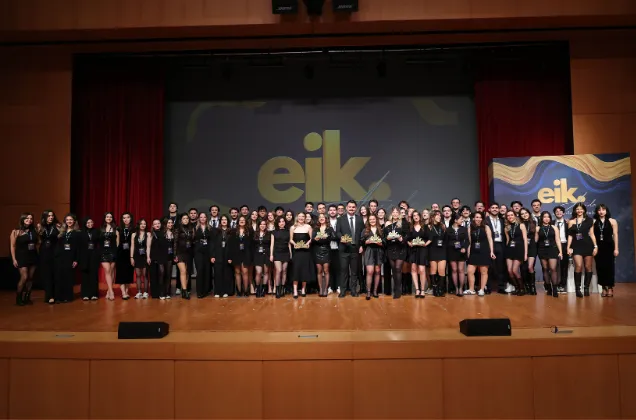10/04/2020
On the sixteenth anniversary of the passing of Sabancı University Honorary President Sakıp Sabancı, the winners of the “Sakıp Sabancı International Research Awards” endowed in his honor were announced. “Economics and Turkey’s Future” was the topic selected for the awards this year, and the Jury Prize was awarded to Professor Lord Nicholas Stern, a researcher who studies the impacts of climate change on the global economy.
In her statement, Sabancı University’s Founding Chairman of the Board of Trustees, Güler Sabancı said: “As the world is facing a major challenge because of the coronavirus epidemic, we see once again that our guide should be science. With science and technology lighting our way, and with the spirit of solidarity, we will recover from this difficulty, together.”
Initiated by Sabancı University to honor the will of Sakıp Sabancı, who passed away in 2004, the Sakıp Sabancı International Research Awards has recognized ideas and scientists focusing on a wide array of topics ranging from inequality to income distribution, climate change to energy, traffic congestion to air pollution and transportation to housing. The winning essays in the Sakıp Sabancı International Research Awards organized around this year’s topic: “Economics and Turkey’s Future” have been announced, and the Jury Prize was awarded to Professor Lord Nicholas Stern, London School of Economics (LSE).
Sabancı University’s Founding Chairman of the Board of Trustees Güler Sabancı, in her statement regarding the subject indicated that the Sakıp Sabancı International Research Awards were an initiative in Turkey, being the first ever such awards and said: “The late Mr. Sabancı always encouraged international thinking. The Sakıp Sabancı International Research Awards make a remarkable contribution to Turkey’s international vision in social sciences.”
Güler Sabancı: “We will recover from this difficulty together”
Güler Sabancı continued her statement: “Every year, on April 10th we organize a ceremony to honor his precious memory, and to present the awards to the winners, but unfortunately, due to the extraordinary conditions, we are not able to hold a meeting this year. We are experiencing times, which make us grasp the wisdom behind the late Mr. Sabancı’s favorite motto, and the title of his last book ‘Health First’. As the world is facing a major challenge due to the coronavirus epidemic, we see once again that our guide should be science. Currently, we need shared reason, science and cooperation more than ever. As individuals are in social containment, the world should do the opposite and unite and collaborate more in order to cope with this problem together. To serve this very purpose, we have mobilized all the capabilities in our university. The solutions that have been developed in our university make the daily routine easier for healthcare professionals, who we are all very grateful to, and we are also supporting vaccine, serum and kit manufacturers in their efforts to develop new solutions by giving them access to the infrastructure in our centers such as Composite Technologies and Nanotechnology. With science and technology lighting our way, and with the spirit of solidarity, we will recover from this difficulty, together.”
“We need common solutions for our common problems”
Güler Sabancı emphasized that Sabancı University started out with the vision of becoming an international university, and thus it is now offering access to universal thinking to its student body through international exchange agreements with universities in more than 50 countries around the world. Güler Sabancı continued: “In a world where knowledge is the greatest asset and it can be shared almost at the speed of light, we see more clearly the need for scientists, who can develop solutions for our common problems. To this end, based on the international perspective that Mr. Sabancı always regarded as important, and enabled by the generous and courageous initiative of Dr.h.c. Dilek Sabancı and Sevil Sabancı, we have founded the Sakıp Sabancı Center for Turkish Studies at Columbia University in 2018, which is working to encourage more research on and a higher level of awareness about Turkey. On the other hand, we think it is also important to meet with scientists, who offer common solutions to the common problems in the world. I congratulate Professor Lord Nicholas Stern, a leader in his field, for receiving the Jury Prize. I also wish success to the essay award winners, young researchers, in their scientifically enlightened journey.
Next two decades will be very critical for the world
Expressing that he feels honored to receive such a special award previously given to very distinguished scientists like Joseph Nye and organized by Sabancı University which was founded by the great philanthropist Sakıp Sabancı, Professor Lord Stern said: “Climate change has been at the center of my work over the last two decades. Unmanaged climate change poses an immense threat to the future of humanity. On current trajectories, including those embodied in the Paris Agreement of 2015, within a century or so, we are headed for average global temperatures over 3 degrees centigrade above those at the end of the 19th century. With an increase of three degrees probably billions of people would have to move, that would likely result in more profound and severe social conflicts. It would reverse the gains in development we have made over the last half century. To stabilize temperatures, we have to go to zero carbon emissions as a world, and to stay at net zero levels within about 50 years. So, the next two decades will be absolutely critical.”
Emphasizing that the drive to net zero can be the most sustainable, inclusive, resilient growth story, Professor Lord Stern said: “This century will be full of discovery, innovation, investment and growth. It will give us cities, where we can move and breathe and be productive. To get there, we will require real leadership, strategy and inspiration. It will also require innovation and creativity, and it will require sound and imaginative finance, surely qualities shown by Sakıp Sabancı in great measure. Turkey is very vulnerable since it is located in southern Europe, but Turkey also has great assets. It has substantial wind and solar resources. And, Turkey, with its special geography and its profound culture, is a focal point for the world. So, we look in this great story for Turkey to be at center stage.”

Three essays from three countries
This year’s award winning essays are:
- Jonathan D. Hall, University of Toronto “Can Tolling Help Everyone? Estimating Aggregate and Distributional Consequences of Congestion Pricing”,
- Hans Koster, Vrije University, Amsterdam “The Welfare Effects of Greenbelt Policy: Evidence from England”, and
- Nick Tsivanidis Berkeley University, California “Evaluating the Impact of Urban Transit Infrastructure: Evidence from Bogotá’s TransMilenio”.
2020 Jury
Led by Eren İnci, Vice Dean of Sabancı University Arts and Social Sciences Faculty, this year’s international awards jury panel was composed of Fuat Keyman, Vice President and Director of Istanbul Policy Center, Sabancı University, Özgür Kıbrıs Dean of Arts and Social Sciences Faculty, Sabancı University, Kemal Derviş Brookings Institute Senior Fellow and Sabancı University International Advisory Board Member, Professor Gilles Duranton University of Pennsylvania, Professor Robin Lindsey, UBC Sauder School of Business, and Professor Matthew Turner, Brown University.

About Lord Prof. Dr. Nicholas Stern
Professor Lord Nicholas Stern is the IG Patel Professor of Economics and Government, Chairman of the Grantham Research Institute on Climate Change and the Environment and Head of the India Observatory at the London School of Economics. He was the President of the British Academy, July 2013 – 2017, and was elected Fellow of the Royal Society in 2014. He was Chief Economist of the European Bank for Reconstruction and Development, 1994-1999, and Chief Economist and Senior Vice President at the World Bank, 2000-2003. He was knighted for services to economics in 2004, made a cross-bench life peer as Baron Stern of Brentford in 2007, and appointed Companion of Honour for services to economics, international relations and tackling climate change in 2017. He has published more than 15 books and 100 articles and his most recent book is “Why are We Waiting? The Logic, Urgency and Promise of Tackling Climate Change”.




